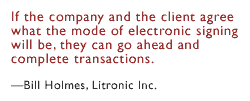|
E-signatures: a milestone
|
 |
June 22, 2000: 12:13 p.m. ET
New law eases legal issue in online contracts, but other hurdles still remain
By Staff Writer Steve Bills
|
NEW YORK (CNNfn) - E-commerce advocates are cheering the passage of federal legislation recognizing electronic signatures, but they caution that this is only a first step in developing the potential of the Internet as a marketplace.
"I see it as a milestone," exulted Bill Holmes, vice president of marketing at Litronic Inc., a maker of Internet data security products, "a recognition (by the government) that the Internet is a place where people want to do business."
The electronic signature bill breezed through Congress last week. President Clinton is expected to sign it.
The key aspect of the legislation is a simple recognition that people may use the Internet to enter into contracts, something that was not at all clear in the law before now.
"It removes obstacles to choosing," said Jane Winn, a faculty member at the Southern Methodist University School of Law in Dallas and co-author of "The Law of Electronic Commerce."
'The intention to be bound'
Under the existing statute of frauds, any contract involving $500 or more required a "signed writing," in the lingo of the law, "a mark made with the intention to be bound," Winn said. A signature on paper meets that standard, as does an "X" mark or even a thumbprint.
 But when it came to an "I agree" button on a Web page, or access to a secure site through a username and password, "it wasn't clear you could replace the piece of paper with an electronic record," she said. But when it came to an "I agree" button on a Web page, or access to a secure site through a username and password, "it wasn't clear you could replace the piece of paper with an electronic record," she said.
For many consumer transactions, this has not made a lot of difference, because the sales typically were for small amounts and employed credit cards, which provide, as Winn modestly put it, "the most astonishing package of consumer protections in Western civilization."
For businesses, however, with their much larger financial transactions, the paperwork is a bigger issue. At General Electric (GE: Research, Estimates) Small Business Solutions, for instance, a small lease deal or loan can range as high as $75,000, said Jeff Kiesel, head of the unit, who sees significant cost savings and faster response times in a market that recognizes electronic signatures.
Time spent passing paperwork
This $75,000 deal now takes 10-to-25 days to complete, from the time the small business makes the application until the money changes hands to lease the truck or whatever, Kiesel said. Anywhere from two days to as many as nine days are spent passing paperwork.
"It's adding very little value. You're wasting 20 to 30 percent of the whole time" it takes to close the deal, Kiesel said. If the law recognizes a signature typed on a computer screen or some other online agreement, the transaction can be completed more quickly and less expensively. "We see tremendous upside," he said.
 Of course, this doesn't solve the whole problem of e-commerce. The lender -- or anybody on the other side of an online transaction -- still must check your credit worthiness or business credentials, and you have to come to terms on a deal, just as you always did. Of course, this doesn't solve the whole problem of e-commerce. The lender -- or anybody on the other side of an online transaction -- still must check your credit worthiness or business credentials, and you have to come to terms on a deal, just as you always did.
And you still have to satisfy yourself that the person on the other side of the computer screen is who she claims to be, and not some mail clerk who sneaked into the boss' office to use the PC.
This law doesn't address any of that. But it does smooth out certain bumps in the road. Some states, Winn said, using Utah as an example, have begun trying to set their own standards for recognizing electronic signatures. The federal law will supersede all that, without endorsing any particular technological scheme.
"The reason the federal government had to act was because the states were going 50 different directions," she said.
Smart cards and iris scans
To deal with the hard questions of authentication and security, companies like Litronic (LTNX: Research, Estimates) are pursuing various technological solutions. Holmes described the company's efforts in public-key infrastructure, which involves long prime numbers to create a digital signature, saying these ID numbers could reside on "smart cards" rather than computer hard drives to limit unauthorized use.
Litronic also is poised to announce next week a new kind of biometric verification, which will use a "Star Trek"-like iris scan to check a user's eye like a fingerprint.
Whatever verification systems exist, "if the company and the client agree what the mode of electronic signing will be, they can go ahead and complete transactions," Holmes said. But he acknowledged such developments will take time. Even the fairly straightforward smart-card technology will take two years or more to come into wide use, he estimated.
In the meantime, companies are likely to move cautiously to take advantage of the new rules. Kiesel of GE Small Business Solutions said his company probably would continue to use ink-on-paper contracts for new customers, although online contracts might be viable for financing clients who have existing relationships.
Winn said the greatest immediate benefit to business is in eliminating a degree of uncertainty about the rules to follow in striking contracts online: "What small and medium businesses need to do is inform themselves and bargain as hard as they can." 
|
|
|
|
|
 |

|

